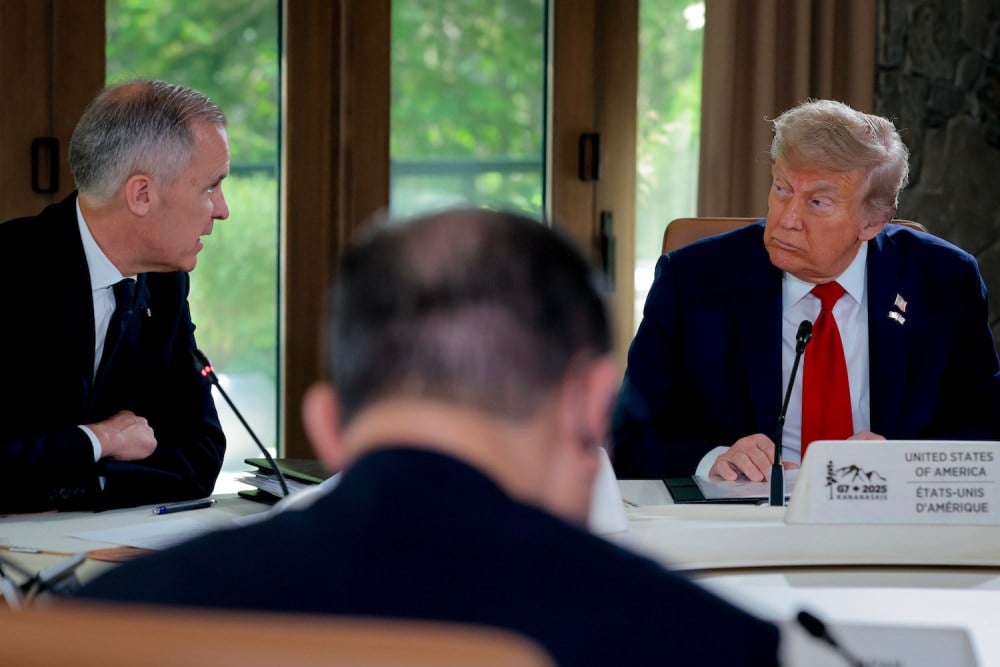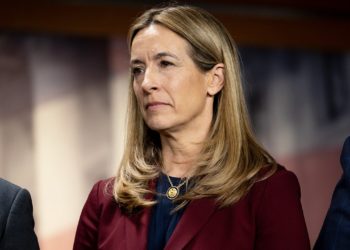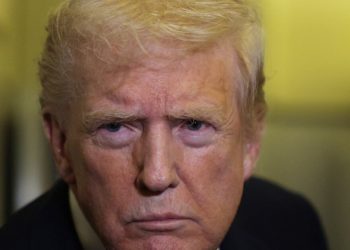Welcome back to World Brief, where we’re looking at a shift in Canada’s trade strategy, another party splinter in French budget negotiations, and European leaders debating how to use frozen Russian assets.
Making New Friends
Canadian Prime Minister Mark Carney embarked on his first official visit to Asia on Friday in an effort to deepen trade and security cooperation with Ottawa’s Asia-Pacific partners. But a U.S.-sized shadow looms large over Carney’s trip, and economists are curious to see whether the Canadian premier will make good on his promise to diversify Canadian exports away from the United States.
For months, Ottawa and Washington have been locked in a high-stakes trade war, with the White House imposing hefty tariffs on Canadian goods and threatening to make Canada the 51st U.S. state; Canada is the United States’ second-largest trading partner, and Ottawa relies on Washington for around 75 percent of its exported products.
However, trade relations reached new lows late Thursday, when U.S. President Donald Trump terminated talks with Canada over an Ontario government ad that uses former Republican President Ronald Reagan’s voice to denounce tariffs.
The audio in the ad, which was broadcast to U.S. audiences, came from an April 1987 radio address, during which Reagan urged the U.S. Congress not to pursue protectionist policies against Japan. The quotes, taken from different parts of Reagan’s speech, were not altered. But the Ronald Reagan Presidential Foundation and Institute has accused Ontario of misrepresenting Reagan’s message, though the agency did not specify how it did so.
Trump on Thursday reposted the institute’s statement on Truth Social and added his own scathing remarks: “[Canada] only did this to interfere with the decision of the U.S. Supreme Court, and other courts,” Trump wrote, referring to legal cases challenging Trump’s tariff authority. “TARIFFS ARE VERY IMPORTANT TO THE NATIONAL SECURITY, AND ECONOMY, OF THE U.S.A. Based on their egregious behavior, ALL TRADE NEGOTIATIONS WITH CANADA ARE HEREBY TERMINATED.”
But Carney appears relatively unfazed by Trump’s threats. “We can’t control the trade policy of the United States,” Carney told reporters on Friday. “What we can control is developing new partnerships and opportunities, including with the economic giants of Asia.” He added that Ottawa stands ready to pick up discussions with Washington once the White House is ready.
According to Canadian Trade Minister Maninder Sidhu, Ottawa is seeking trade agreements with Japan, Malaysia, the Philippines, and South Korea. Carney is also set to court India and China, including potentially meeting with Chinese President Xi Jinping.
Earlier this week, Carney vowed to double Canada’s non-U.S. exports in the next decade to move away from U.S. dependence. “Many of our former strengths—based on close ties to America—have become our vulnerabilities,” Carney said on Wednesday, adding that “we have to take care of ourselves because we can’t rely on one foreign partner.” Last month, Canada signed a trade deal with Indonesia to establish duty-free access for up to 95 percent of exported goods.
Today’s Most Read
- U.S. Sanctions Major Russian Energy Companies by Sam Skove
- Trump Faces MAGA Backlash for Argentina Bailout by Keith Johnson
- Giorgia Meloni’s Winning Streak by Michele Barbero
What We’re Following
Withdrawing support. France’s Socialists threatened on Friday to topple Prime Minister Sébastien Lecornu’s fragile governing coalition if the party’s budget demands are not met. “We have made an effort not to censure the prime minister, but so far we have not seen any sign of a willingness to compromise,” Socialist Party leader Olivier Faure told local media on Friday. “If there is no change by Monday, it’s all over.”
Last week, Lecornu sacrificed a major economic policy by suspending President Emmanuel Macron’s pension reform plan until after the 2027 presidential election in order to secure a governing coalition with the Socialist Party and survive two no-confidence votes. But the Socialists’ backing came with conditions—namely, that Lecornu must include a tax on the ultra-wealthy in the budget proposal. As of now, the prime minister remains opposed to such a measure.
A formal vote on the income part of the budget is scheduled for Nov. 4, but the Socialists have pledged to file a no-confidence vote early next week if Lecornu does not cave to their demands. This would be the third such motion against the French premier in less than a month and is likely to further deadlock the country’s deeply divided National Assembly.
What to do with frozen assets. Members of the 35-nation coalition of the willing, a group that advocates for aid to Ukraine, convened in London and virtually on Friday to discuss using frozen Russian assets to assist Kyiv. Among the leaders in attendance were British Prime Minister Keir Starmer, Ukrainian President Volodymyr Zelensky, and NATO chief Mark Rutte.
On Thursday, the European Union approved sweeping sanctions on Russian oil, gas, and banking but stopped short of endorsing a plan that would use the country’s frozen assets to fund a massive loan to Ukraine. This hesitance was largely led by Belgium, whose financial institution Euroclear holds many of the assets; Belgian Prime Minister Bart De Wever has warned that he will only back the proposal if all other EU nations share the costs of any legal action that Russia pursues and if they all contribute financially if the money has to be paid back.
Also on Friday’s agenda, European leaders discussed accelerating weapons shipments to Kyiv, something Zelensky has long advocated for. Under a new fast-track procurement system, NATO members can purchase U.S.-made weapons to give to Ukraine. However, the sale of much-needed U.S. Tomahawk missiles appears to be off the table for now, after Trump seemed to backtrack last Friday on his previous openness to providing the weapons.
An election-heavy 72 hours. This weekend is one for the ballot boxes. On Friday, Ireland kicked off the election cycle with a vote on the country’s next president. Although results are expected to be announced on Saturday, early polling suggests that left-wing independent candidate Catherine Connolly will win in a landslide. Connolly has become popular among young people for calling reunification with Northern Ireland a “foregone conclusion,” taking a strong pro-Palestine stance, embracing the Irish language, and criticizing growing EU militarization. But it is unclear how an AI-generated deepfake video (posted on Tuesday) of Connolly falsely withdrawing from the race will affect her candidacy.
On Saturday, elections will turn to the Ivory Coast, where President Alassane Ouattara is seeking a fourth term. Ouattara is the clear favorite, being the only candidate in the five-person race with backing from a strong political party; Ouattara’s two most prominent challengers were barred from running. Ouattara is campaigning on economic growth, such as investing in schools, roads, and a 60,000-seat stadium. But critics have accused Ouattara of cracking down on political dissent with his nationwide ban on protests.
To cap off the weekend, Argentina will hold midterm elections on Sunday. While President Javier Milei is not on the ballot himself, the vote is expected to be a big test for his La Libertad Avanza party, which is hoping to take control of both chambers of Congress. But early polling predicts a tight race, as investors brace for a new round of market swings and currency devaluations following Buenos Aires’s recent bailout deal with the United States, worth up to $40 billion.
What in the World?
Japan elected its first female prime minister, Sanae Takaichi, on Tuesday. An ultraconservative who believes the military should be expanded, she is known as the protégé of which former prime minister?
A. Fumio Kishida
B. Shinzo Abe
C. Yasuo Fukuda
D. Yoshihide Suga
Odds and Ends
While historians and police scramble to locate the items stolen from Paris’s Louvre on Sunday, one German company has found a silver lining. Within 24 hours of the heist, German lift manufacturer Böcker noticed that the burglars had used one of its ladders to reach the museum’s second floor, and it decided to make the theft into a marketing opportunity. “When you need to move fast,” Böcker posted to Facebook on Monday below a photo of the crime scene. “The Böcker Agilo transports your treasures weighing up to 400kg at 42m/min—quiet as a whisper.” Quiet as a whisper, indeed; the heist took place during broad daylight at around 9:30 a.m. local time.
And the Answer Is…
B. Shinzo Abe
Takaichi’s governing coalition is still two votes shy of a majority in parliament, putting her ability to implement her policies in doubt, William Sposato writes.
To take the rest of FP’s weekly international news quiz, click here, or sign up to be alerted when a new one is published.
The post Canada Seeks New Trade Partners in Asia After Trump’s Blowup appeared first on Foreign Policy.




